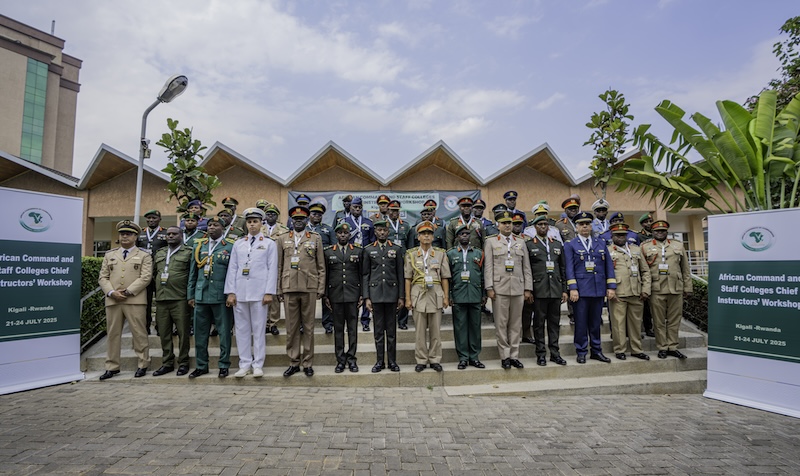Chief instructors of Command and Staff Colleges from 18 nations met in Kigali, Rwanda, in July for a workshop on improving military training and education, while cultivating a common understanding of emerging threats driven by new technologies.
The theme of this year’s African Command and Staff Colleges Chief Instructors Workshop was “The Future of African Military Training and Education: Bridging the Digital Divide.”
“The overarching aim of this workshop is to strengthen collaboration through open dialogue and mutual learning,” Brig. Gen. Andrew Nyamvumba, commandant of the Rwanda Defence Force (RDF) Command and Staff College, said in a news release.
(RDF Chief of Defence Staff Gen. Mubarakh Muganga said the workshop was timely as threats to African peace and security are increasingly complex and dynamic. The four-day workshop ended July 24.
“As technology evolves rapidly, so too must our training methods and educational approaches,” Muganga said in a report by Rwandan publication The New Times. “We must ensure that no military institution or officer is left behind in the digital era.”
Terror Groups Leveraging AI
Militaries’ use of technology is critical in countering terror groups in Africa, which have begun using new tools such as artificial intelligence (AI) to conduct propaganda and recruitment campaigns. AI also has been used for hacking and creating weapons, such as drones and self-driven vehicular bombs.
“Integrating artificial intelligence into drones has changed war tactics, allowing more advanced and strategic applications,” researcher Claris Nelu wrote for the International Centre for Counter-Terrorism.
According to Military Africa, militaries in Kenya, Nigeria and South Africa have embraced the digital age by using simulated battlefield technologies — including laser-based systems, virtual reality environments, computer-generated scenarios and advanced flight simulators — as cost-effective, efficient alternatives to traditional military training methods. These technologies help countries strengthen combat readiness, increase operational efficiency and modernize their armed forces.
Experts say 30 simulated exercises can be conducted for the cost of a single brigade-level live drill, which typically involves hundreds of troops and heavy equipment, Military Africa reported. This cost reduction makes simulation training feasible and attractive for militaries seeking to maximize their resources.
A June Interpol report showed a that a growing number of reported crimes on the continent are cyber-related. Two-thirds of Interpol’s African member countries reported that cyber-related crimes accounted for a medium-to-high share of all crimes, rising to 30% in East and West Africa. The National Kenya Computer Incident Response Team — Coordination Centre detected more than 4.5 billion cyber threat events from April to June, Kenyan newspaper The Star reported.
Building Lasting Partnerships
The workshop was attended by 35 military representatives from Botswana, Cameroon, Egypt, Ethiopia, Ghana, Guinea, Kenya, Libya, Malawi, Morocco, Namibia, Nigeria, South Sudan, Tanzania, Uganda, Zambia and Zimbabwe.
“We are determined to work with all member states to enhance cooperation, standardize cultural content and integrate digital innovation into our training systems,” Muganga said in a news release.
Brig. Gen. David Chesire, chief instructor at the Joint Command and Staff College in Kenya, said many discussions focused on strengthening collaboration among command and staff colleges, particularly through student and staff exchanges. He emphasized the importance of cooperation in addressing emerging security threats.
Col. Masheke Mutemwa, chief instructor of the Air Wing at the Zambia Defence Services Command and Staff College, said the workshop offered opportunities for participants to engage and interact on military issues.
As the workshop ended, Rwanda pledged its commitment to deepening collaboration among member states.
“Let the strategies discussed here find their way into curricula, classrooms, and field exercises,” Muganga said in a news release. “Let the networks formed here grow into lasting partnerships. The future of African military training and education is in their hands.”

